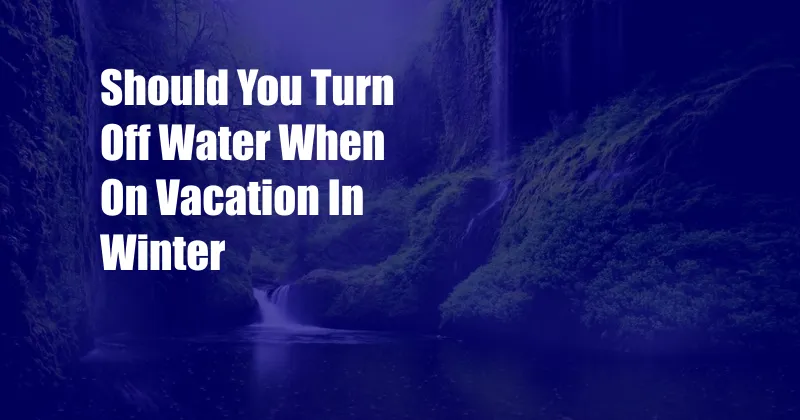
Should You Turn Off Water When on Vacation in Winter?
As winter approaches, homeowners may wonder whether they need to turn off their water supply while away on vacation. While this decision depends on various factors, understanding the potential risks and benefits associated with this practice is crucial.
To determine the right course of action, let’s explore the advantages and disadvantages of turning off water during an extended absence.
Advantages of Turning Off Water
Turning off the water supply during vacation offers several advantages:
- Prevents Water Damage: A burst pipe due to freezing temperatures is a major concern during winter vacations. Turning off the water eliminates the pressure in the pipes, minimizing the risk of leaks and resulting water damage.
- Conserves Energy: Keeping the water heater running consumes significant energy even when not using hot water. Shutting off the water supply helps reduce energy waste and lower utility bills.
Disadvantages of Turning Off Water
Despite the benefits, turning off water on vacation also has some drawbacks:
- Risk of Frozen Pipes: If the temperature drops below freezing and the water in the pipes remains stagnant, it can freeze and expand, potentially causing pipe bursts or damage.
- Inconvenience: Upon returning from vacation, it takes time to turn the water back on and flush the lines, which can be inconvenient.
- Plumbing Issues: If the water supply is turned off for an extended period, the seals and gaskets in the plumbing fixtures may dry out and fail, leading to leaks.
Weighing the Factors
Ultimately, the decision of whether to turn off the water when on vacation in winter depends on the following considerations:
- Duration of Absence: Extended vacations (more than a week) may warrant turning off the water to minimize the risk of frozen pipes.
- Climate: If the region experiences extreme winter temperatures, it’s advisable to turn off the water to prevent freezing.
- Plumbing Age and Condition: Older plumbing systems with leaks or rust are more susceptible to freezing damage. Turning off the water in these cases may be prudent.
- Heated Home: If the house will be heated during the vacation, it may be sufficient to keep the water flowing to prevent freezing.
Tips and Expert Advice
If you decide to turn off the water, follow these expert tips:
- Drain Water Lines: Open all faucets and flush toilets to remove standing water.
- Turn Off Main Water Valve: Locate the main water valve (usually near the water meter) and turn it off at a 90-degree angle.
- Protect Outdoor Faucets: Disconnect garden hoses and wrap outdoor faucets with insulating material to prevent freezing.
Upon returning from vacation, remember to:
- Turn On Main Water Valve: Turn it on slowly to prevent water hammer in the pipes.
- Flush Water Lines: Run water through all faucets and flush toilets to clear any sediment or air.
- Check for Leaks: Inspect all plumbing fixtures for any signs of leaks or damage.
FAQs
Q: Can I turn off my water heater as well?
A: Yes, turning off the water heater is recommended to prevent energy waste. Remember to drain the tank before doing so.
Q: What if I have automatic sprinklers?
A: Turn off the water supply to the sprinklers and drain the lines to prevent freezing.
Q: Is it better to leave a faucet dripping?
A: Leaving a cold water faucet dripping slowly can help prevent freezing, but it’s not necessary if all other precautions are taken.
Conclusion
Deciding whether to turn off the water on vacation in winter is a matter of weighing potential risks and benefits based on individual circumstances. By following the tips and expert advice provided, homeowners can minimize the chances of water damage while enjoying a peaceful vacation.
Would you like more information on this topic? Share your comments and questions below.